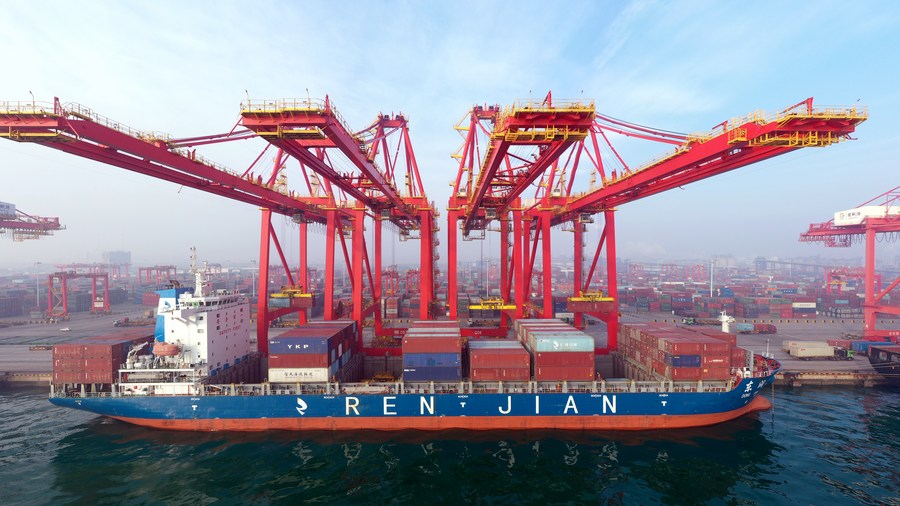China's impact on the fate of the global balance sheet

This aerial photo taken on Jan 26, 2022 shows a cargo vessel at Rizhao Port in Rizhao, East China's Shandong province. [Photo/Xinhua]
Just as a corporate balance sheet can provide insights into a company's financial health, a "global balance sheet" (GBS), tallying the assets and liabilities of governments, corporations, households, and financial institutions, can do the same for the world economy. That logic drove the McKinsey Global Institute (MGI) to begin compiling, and regularly updating, a GBS covering 10 countries that together represent more than 60 percent of the world GDP.
MGI's first GBS, released in late 2021, showed that during the first 20 years of this century, global assets grew faster than output. In 2020, assets on the world's balance sheet totaled more than $1.5 quadrillion (about 18.1 times their GDP) — about triple the total in 2000(when assets amounted to about 13.2 times the GDP). The growth of global wealth also outpaced (rather tepid) GDP growth, implying that wealth became increasingly concentrated among those with real estate and financial assets.
In 2020 and 2021 — the first two years of the COVID-19 pandemic — these trends accelerated, with the global balance sheet swelling even as GDP growth stalled. In fact, despite billions of dollars in income losses, $100 trillion was added to global wealth during this period, fueled largely by unprecedented fiscal and monetary expansion. As $39 trillion in new currency and deposits were minted, asset prices skyrocketed. Meanwhile, debt liabilities grew by about $50 trillion, and equity liabilities by $75 trillion.
Since the beginning of the 21st century, the expansion of the financial sector, mainly through debt creation, has played a major role in boosting net worth (assets minus liabilities), mostly via the price effect. In the 2000-21 period, 50 percent of the increase in net worth came from asset-price increases above inflation, 29 percent from general inflation, and only 23 percent from net investment. So, although global net worth grew, investment in the real economy remained relatively low. Excessive financialization thus undermined productivity growth.
The picture changed significantly in 2022. While financialization continued, the GBS shrank relative to GDP for the first time in decades.
The Russia-Ukraine conflict, which has driven up energy and food prices, exacerbated inflation, spurring major central banks to hike interest rates. Real global equity and bond prices declined by about 30 percent and 20 percent, respectively, sapping net worth in many countries, especially Australia, Canada, China, Germany, and Sweden. Meanwhile, a declining real-estate market reduced not only net worth (wealth), but also consumption, particularly in China, where real estate constitutes some 60 percent of household assets.
As 2023 begins, the obvious question is: Will 2022 mark a turning point, after which the GBS will continue its slide, or will global assets and wealth resume their climb relative to GDP? The answer depends significantly on policies in China, which accounted for 18 percent of world GDP and global net worth in 2021.
Judging from the recent Central Economic Work Conference — where the economic-policy agenda is decided each year — Chinese policymakers will focus on stimulating demand, stabilizing the housing market, and supporting growth using fiscal and monetary tools. For example, Vice-Premier Liu He announced plans to boost fiscal support and increase liquidity for the stressed real-estate sector.
A global slowdown may also be a drag on global aggregate demand, hurting Chinese trade, while continued supply-chain disruptions will compound the damage. And then there is the demand-crushing impact of natural disasters, which are becoming increasingly likely as climate change progresses.
Making matters worse, economic relations with the United States are becoming increasingly fraught, with the US implementing measures — such as restrictions on sales of semiconductors and the machines that produce them — aimed at starving China's economy of advanced technologies and components. That is why China's leaders have signaled support for private business and State-owned enterprises, including the easing of regulatory actions that disrupted business confidence in various sectors.
US policies targeting China point to a bigger problem: international economic cooperation is becoming increasingly difficult to sustain. But the GBS shows that, while policy mistakes in large, systemically important economies can push down the entire global economy, no single economy today can lift it. In other words, cooperation is vital to prevent a classic balance-sheet recession (when asset markets deflate, and liquidity is tightened).
Andrew Sheng, a distinguished fellow at the Asia Global Institute at the University of Hong Kong, is a member of the UNEP Advisory Council on Sustainable Finance. Xiao Geng, chairman of the Hong Kong Institution for International Finance, is a professor and director of the Institute of Policy and Practice at the Shenzhen Finance Institute at The Chinese University of Hong Kong, Shenzhen.
Photos
 Village visited by Xi embarks on journey of rural revitalization
Village visited by Xi embarks on journey of rural revitalization Tourists take part in lantern parade to celebrate Chinese New Year in E China's Anhui
Tourists take part in lantern parade to celebrate Chinese New Year in E China's Anhui Scenic spots in Xi'an welcome legions of tourists with colorful lights and lanterns
Scenic spots in Xi'an welcome legions of tourists with colorful lights and lanterns Miao people participate in traditional dancing activity in SW China's Guizhou
Miao people participate in traditional dancing activity in SW China's Guizhou
Related Stories
- Hong Kong consolidates global financial hub status with innovation, green finance initiatives
- China's financial institutions' assets up 10.1 pct
- China's central bank injects liquidity into market in November
- Key takeaways from Annual Conference of Financial Street Forum 2022
- Chinese market welcomes qualified foreign financial institutions: official
- China front-loads 2023 central budget funds
Copyright © 2023 People's Daily Online. All Rights Reserved.





